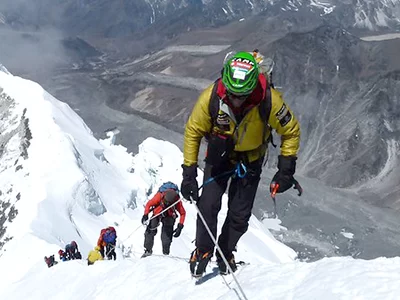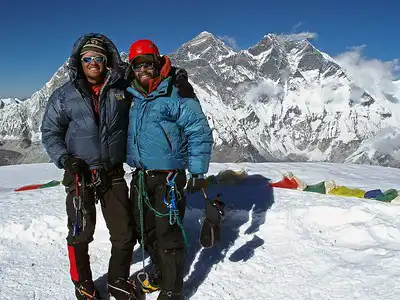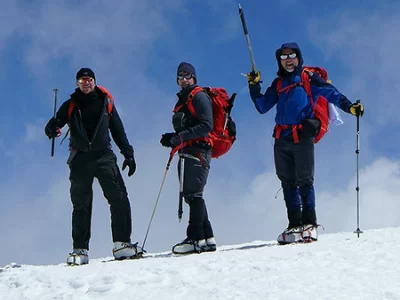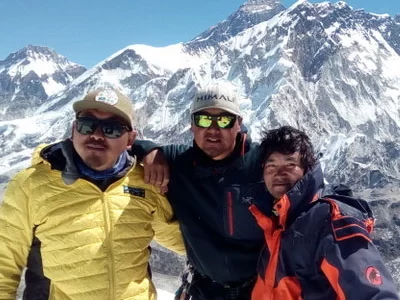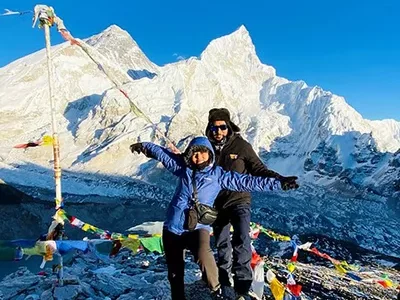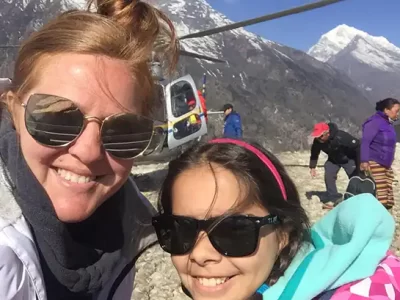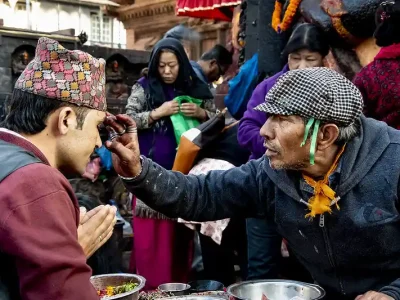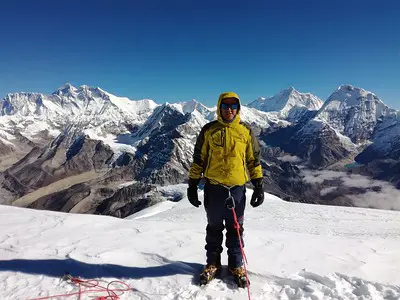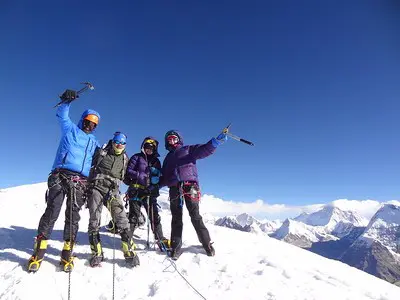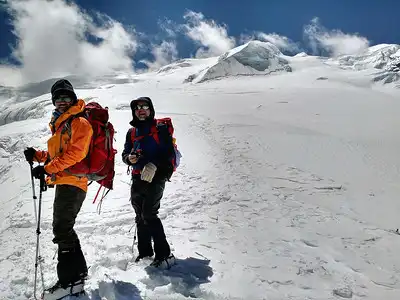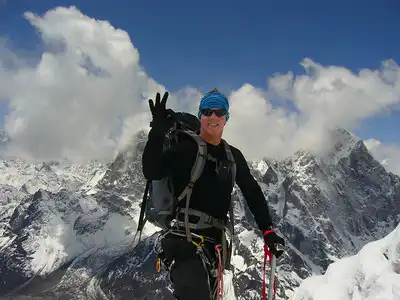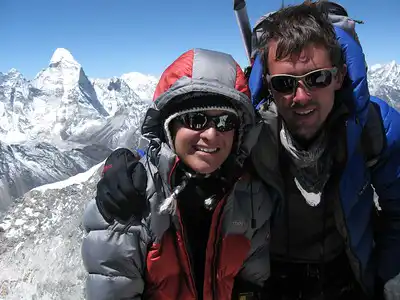Island Peka, or Imja Tse, locally known, is a notable trekking peak at 6189 meters in Nepal’s Khumbu region. Climbers consider it one of the best because it provides an accessible challenge and a chance to experience the highlands of the Himalayas. The cost of climbing Island Peak, or the Island Peak Climbing Cost, is a crucial consideration for anyone planning this climbing, as it can vary widely based on several factors, including season, the extent of services included, and the duration of the trek.
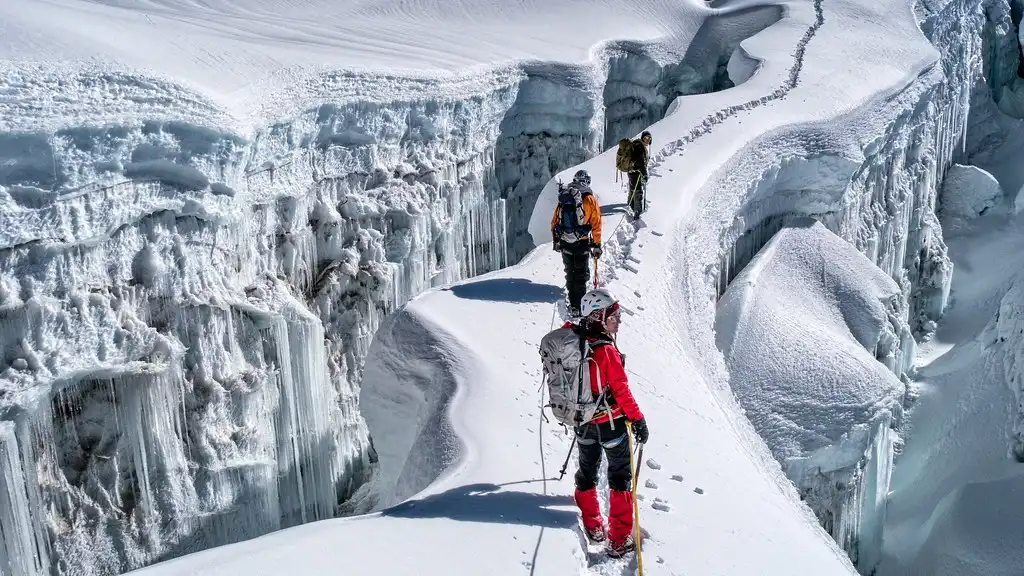
Growing in popularity as it is, island peak climbing also gets more complex when it comes to climbing planning/budgeting. The article will discuss all types of expenses associated with climbing Island Peak, such as permits, guides’ charges, etc. This comprehensive overview will provide a complete picture of what potential climbers should expect financially for the trek to enable them to plan their budget correctly to enjoy that fantastic scenery and testing climb that characterizes Island Peak.
Detailed Breakdown of Costs for Climbing Island Peak
To help you plan for your trip in terms of logistics and money, we will examine the different costs of climbing. We will go through everything from the required permits to hiring guides and daily expenses on the trail so that your adventure is well organized.
Be it a seasoned hiker who always takes on mountain tops or an amateur attempting his first significant ascent, knowing these costs is critical to having a satisfying and outstanding encounter on Island Peak.
Island Peak Climbing with EBC Trek
Ama Dablam Expedition
Mera Peak Climbing
Permit Costs for Island Peak Climbing
Island Peak, a famous trekking peak in Nepal, requires multiple permits to ensure compliance with local regulations. These permits protect the natural environment and support the infrastructure for high-altitude trekking. Understanding the Island Peak Climbing Cost, especially regarding permits, is critical to successful planning.
Climbing Permit
The Island Peak permit cost varies depending on the season:
- Spring Season (March-May): This is the peak climbing season, with permits costing around USD 250 per person. Spring offers the most favorable weather for climbing.
- Autumn Season (September-November): This is another popular time to climb, and the permit fee is around USD 250.
- Winter and Summer Seasons (December-February, June-August): Due to lower demand and harsher weather conditions, permits are more affordable during the off-season, typically around USD 125.
Before starting the trek, you must obtain a climbing permit through the Nepal Mountaineering Association (NMA).
Sagarmatha National Park Entry Permit
Island Peak is within the Sagarmatha National Park and requires a separate entry permit. The cost for this permit is approximately USD 30 per person. This fee supports the conservation efforts in the national park, which is home to Mount Everest and other significant Himalayan peaks. You can obtain the Sagarmatha National Park permit in Kathmandu or at the park’s entry gate in Monjo.
Khumbu Rural Municipality Permit
In addition to the climbing and national park permits, trekkers must obtain the Khumbu Rural Municipality Permit. All trekkers entering the Khumbu region must pay approximately USD 20 for this permit. You can buy it in Lukla or Monjo.
Guide and Porter Fees for Island Peak Climbing
Hiring a guide and porter for Island Peak climbing is essential for safety and support. Guides help navigate the route, assist with acclimatization, provide insights into the local culture, and ensure your overall well-being during the climb.
By carrying your equipment, porters enable you to focus on the physical aspects of the trek. This section will break down the Island Peak guide fees and associated costs.
Importance of Hiring a Guide
Climbing without an experienced guide in this context can lead to an unfortunate disaster. Unlike any other place on earth, the area has some of the most dangerous terrains, so climbers need skilled personnel. They know where to go when bad weather strikes, possible dangers on the way, and when one becomes sick due to increased height above sea level.
People should hire mountain guides who help them avoid altitude sickness and its consequences. Apart from these, they assist their customers by telling them about different cultures, arranging beds, and applying for permits.
Daily Rates for Guides and Porters
- Island Peak guide fees typically range from USD 25 to USD 35 per day, but the cost may vary depending on experience and qualifications.
- Porter costs are generally around USD 15 to USD 20 per day. A porter can carry 20-25 kg of your gear, significantly easing the physical strain of the trek.
Guides and porters are typically hired through trekking agencies, making the process easier and more reliable for climbers. Peregrine Treks and Tours offers comprehensive packages that include guide and porter services, simplifying the organization of your trek.
These packages cover the cost of the guide and porter and additional logistics like meals, accommodation, and permits, making it easier to manage your overall Island Peak trek expenses. By hiring through Peregrine Treks and Tours, you ensure that the necessary support is in place for a safe and successful climb while having peace of mind that the logistics are taken care of in advance.
Guide and Porter Packages
Some trekking agencies offer all-inclusive packages for Island Peak, including guide and porter services. These packages can reduce overall Island Peak trek expenses by bundling multiple services. Typically, packages range from USD 2,500 to USD 3,000, covering permits, accommodation, meals, and the services of guides and porters.
Lobuche Peak Climbing
Everest Base Camp Trek
Everest Base Camp Trek with Helicopter Return
Trekking and Climbing Gear Rental Costs: Impact on Island Peak Climbing Cost
Climbing Island Peak requires specialized equipment to ensure safety and success at high altitudes. Proper gear is crucial for tackling the technical aspects of the climb, including navigating icy slopes, crevasses, and high-altitude weather conditions.
Understanding the Island Peak Climbing Cost involves accounting for gear expenses, which can be rented or purchased depending on your needs and budget. This section includes the required essential equipment, gear rental options, and approximate costs.
Essential Gear for Island Peak Climbing
To ensure a safe ascent, climbers must have the following gear:
- Mountaineering Boots: Sturdy, insulated boots for high-altitude conditions and ice climbing.
- Crampons: Metal spikes attached to boots to provide traction on icy surfaces.
- Ice Axe: Essential for climbing steep icy sections and providing glacier stability.
- Climbing Harness: Required for securing yourself during the climb.
- Ropes: Necessary for glacier travel and steep sections of the ascent.
- Helmet: Protects against falling ice or rocks.
- Carabiners and Ascenders: These secure and manage rope systems during climbing.
Gear Rental Options in Kathmandu and the Khumbu Region
Many climbers rent their gear in Kathmandu or the Khumbu region to minimize the cost of purchasing equipment. Peregrine Treks and Tours offers rental options for various gear items, and rental shops are available in Kathmandu’s Thamel area and Namche Bazaar, a key hub for trekkers in the Everest region.
Renting gear is ideal for those who only plan to climb once or occasionally, as purchasing all the equipment can significantly increase the overall Island Peak Climbing Cost.
Approximate Gear Rental Costs
Here is an overview of the approximate costs for renting essential equipment for the trek:
- Mountaineering Boots: USD 5–10 per day.
- Crampons: USD 5–8 per day.
- Ice Axe: USD 5–7 per day.
- Harness and Ropes: USD 5–8 per day.
- Helmet: USD 4–6 per day.
- Down Jacket: USD 10–15 daily (essential for higher altitudes).
- Sleeping Bag: USD 5–10 per day (depending on insulation level).
Navigating Accommodation and Food Costs for Island Peak Climbing
When planning an Island Peak adventure, understanding the climbing costs is crucial, especially concerning accommodation and food expenses.
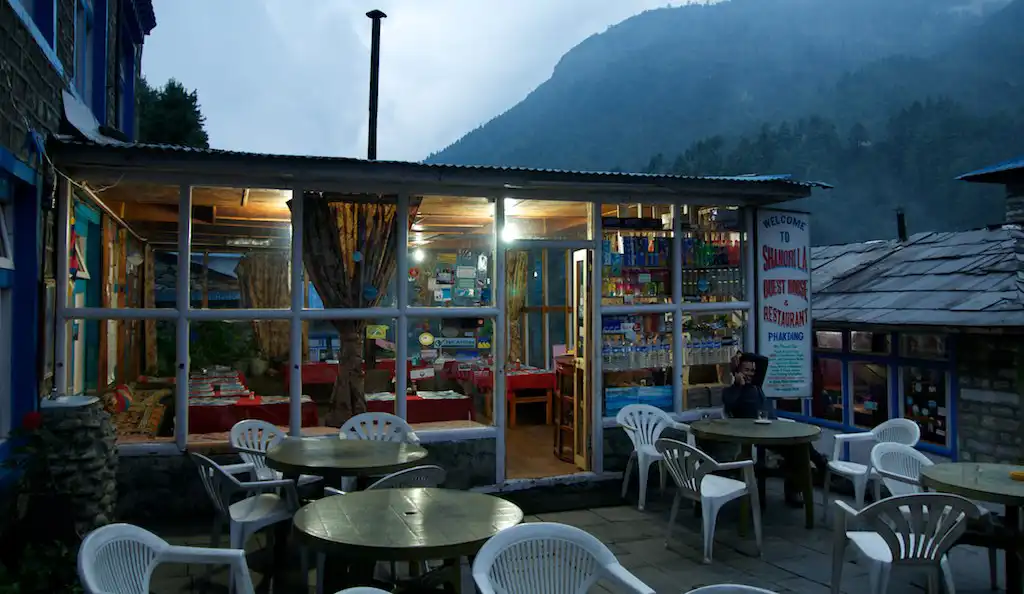
These costs vary significantly by altitude and location, increasing as one ascends the trekking route. This guide aims to break down these essential costs, providing clear information to help climbers budget effectively.
Accommodation Costs Along the Trekking Route
Tea houses and lodges are the mainstays for climbers on the Island Peak trek, offering basic yet comfortable accommodations. The cost varies with altitude and season:
- In lower-altitude areas like Lukla and Phakding, lodging typically costs between USD 5 and USD 10 per night.
- At mid-altitude stops such as Namche Bazaar and Tengboche, prices range from USD 10 to USD 20 per night due to greater demand and the remote location.
- Nearer to Island Peak in high-altitude areas like Dingboche and Chukhung, accommodation costs can spike between USD 20 and USD 40 per night, reflecting the challenges of supplying these remote locations.
Food Costs at Various Altitudes
As you ascend the route to Island Peak, the cost of meals increases due to transportation difficulties:
- At lower elevations (Lukla, Phakding), meals are reasonably priced, around USD 5 to USD 7, and they offer a mix of Nepali and Western dishes.
- In mid-elevation areas (Namche Bazaar, Tengboche), meal prices rise from USD 7 to USD 10.
- At higher altitudes (Dingboche, Chukhung), expect to pay USD 10 to USD 15 per meal, reflecting the increased logistics costs.
Camping Costs and Equipment
Camping is a viable option for those who prefer solitude, especially at the higher base camps close to Island Peak. Camping involves additional costs and logistics:
- Camping Gear Rental: You can rent tents, sleeping bags, and other equipment in Kathmandu or Namche Bazaar. The daily cost ranges from USD 5 to USD 15 per item.
- Hiring a Cook: If you choose to camp, hiring a cook will cost approximately USD 20 to USD 30 per day. This cost includes food preparation and ensuring you have hot meals during the climb.
Transportation Costs for Island Peak Climbing
Transportation to and from the trek starting point is crucial to the overall Island Peak Climbing Cost. Since Island Peak lies in the Everest region, reaching the trailhead requires careful planning.
The most common and practical option is to fly from Kathmandu to Lukla, but there are alternatives, including helicopter rides and road transport to nearby locations. This section will break down the costs and options to help you budget for your trip.
Flights from Kathmandu to Lukla
Flying from Kathmandu to Lukla is the most convenient and widely used transportation method for trekkers. The 30-minute flight from Kathmandu to Lukla showcases stunning aerial views of the Himalayas.
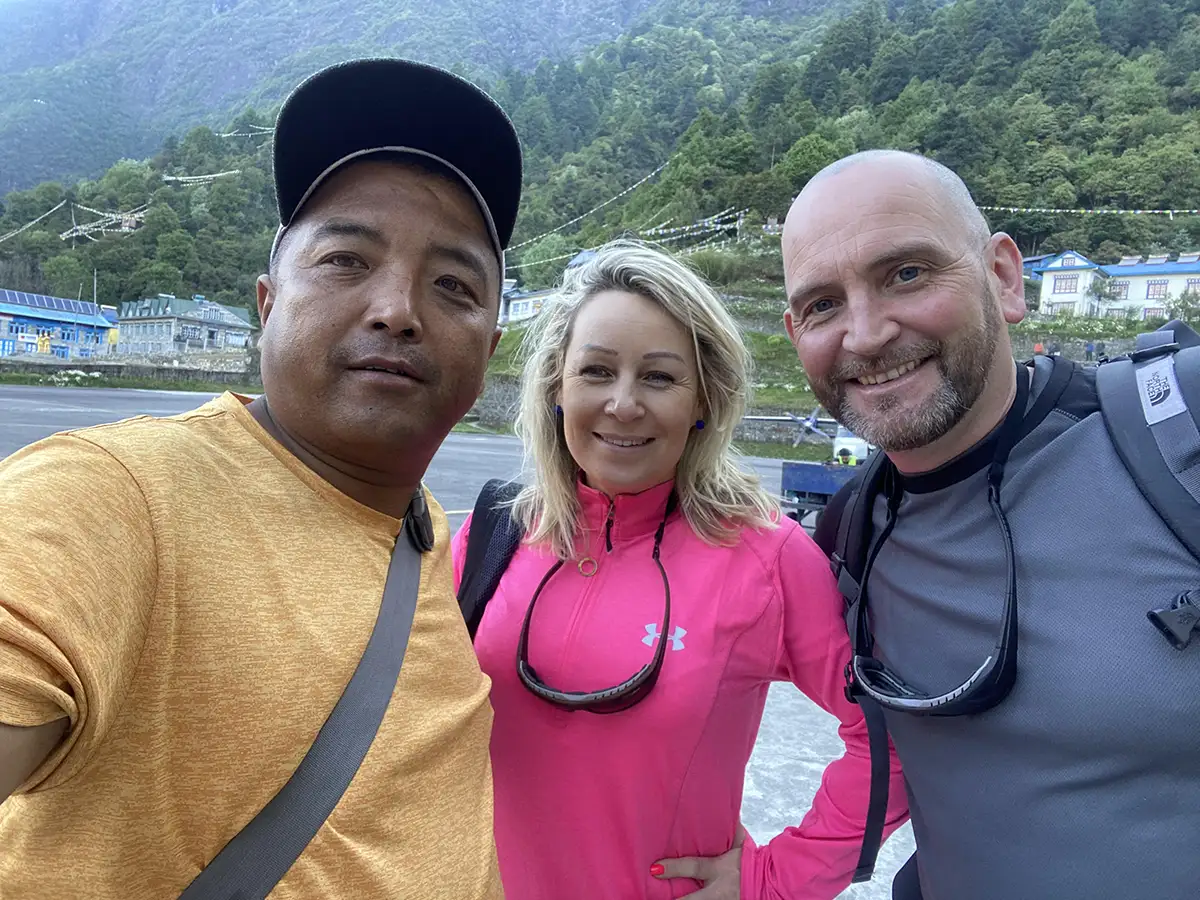
However, due to weather conditions and the small size of Lukla Airport, flights are often subject to delays.
- Cost of a round-trip flight from Kathmandu to Lukla: The price typically ranges from USD 180 to USD 200 per person each way, and the total cost can be between USD 360 and USD 400.
Alternative Transportation Options
While flying to Lukla is the quickest option, there are alternatives for those looking to reduce costs or avoid potential flight delays.
Helicopter Rides
Helicopter services are available for those willing to pay a premium for flexibility and a direct connection to Lukla. Helicopter rides are less affected by weather and can land in remote areas, making them a reliable option.
- Cost of a helicopter ride: A one-way helicopter flight from Kathmandu to Lukla typically costs between USD 500 and USD 1,000 per person, depending on group size and demand.
Road Transport to Phaplu
You can take a road trip to Phaplu for a more budget-friendly alternative and then trek to Lukla. This option is much cheaper but adds extra trekking days to your trip.
- Cost of road transport: A jeep ride from Kathmandu to Phaplu costs around USD 20 to USD 25 per person.
- Trekking from Phaplu to Lukla: This trek takes 2 to 3 days, and you should budget for accommodation and meals during the additional days, which will increase your overall Island Peak trek expenses.
Navigating Insurance Costs for Island Peak Climbing
Present-day coverage is essential for efficiently controlling Island Peak Climbing Cost. High-altitude trekking and climbing are inherently tricky, so full insurance coverage is needed. This guide provides a bare minimum of insurance for high-altitude activities and lists the average prices for comprehensive insurance plans.
Importance of Insurance for High-Altitude Trekking and Climbing
Climbing at high altitudes like Island Peak exposes you to specific risks such as acute mountain sickness (AMS), frostbite, or severe medical emergencies that may require quick evacuation. An effective insurance policy for such climbings covers the following:
- Emergency medical care: Guarantees necessary treatment for illnesses or injuries during the climb.
- Helicopter evacuation: Essential for quick transport from remote areas to medical facilities.
- Repatriation: Ensures the cost of returning you to your home country for medical care is covered.
Estimated Costs for Comprehensive Insurance Coverage
The insurance cost varies depending on the provider, climber’s age, trip duration, and specific policy inclusions. Here are the expected costs for a comprehensive insurance plan suitable for an Island Peak trek:
- Basic high-altitude insurance packages typically cost USD 100 to USD 150 for the trip duration. These plans generally cover emergency medical expenses and evacuation.
- More comprehensive packages, ranging from USD 200 to USD 300, include additional features like trip cancellation, lost baggage, and repatriation.
Selecting the Right Insurance Provider
Choosing a well-known insurance company that handles high-altitude trekking and mountaineering expedition claims is imperative.
Reviewing reviews and addressing their queries, former climbers may help identify reliable providers, particularly those noted for often handling intricate claims like evacuation or medical expenses within Nepal.
Trekking and Expedition Package Options for Island Peak Climbing
When planning for Island Peak climbing, choosing between all-inclusive trekking packages and DIY options is crucial in managing your overall Island Peak Climbing Cost.
Trekking agencies, like Peregrine Treks and Tours, offer comprehensive packages that cover permits, guides, food, and accommodation, streamlining the climbers’ preparation process. This section will explore these options, compare costs, and help you determine the best approach for your climb.
All-Inclusive Trekking Packages
Trekking agencies, including Peregrine Treks and Tours, provide all-inclusive packages that simplify your planning. These packages typically include:
- Island Peak permit cost: Covers the necessary climbing and national park entry permits.
- Island Peak guide fees: Includes experienced and certified guides to assist you throughout the trek.
- Porters: Help carry your gear, reducing physical strain.
- Accommodation: Lodging in tea houses or camping along the route.
- Meals: Daily meals during the trek.
- Transportation: Flights to and from Lukla or alternative transportation options.
Price Ranges for All-Inclusive Packages
The price of an all-inclusive Island Peak trekking package typically ranges from USD 2,500 to USD 3,500. The variation depends on factors such as the duration of the trek, the quality of accommodations, and the inclusiveness of services like gear rental and additional support staff.
Miscellaneous Expenses for Island Peak Climbing
When planning for the total Island Peak Climbing Cost, you must consider additional expenses beyond permits, guides, and accommodation. These miscellaneous costs can add up, so factoring them into your budget is essential. Here are some of the ordinary miscellaneous expenses you might encounter during your climb:
Tips for Guides and Porters
Tipping is customary in Nepal, especially for the guides and porters who assist you throughout the trek. While tipping is not mandatory, it is a sign of appreciation for their hard work and dedication.
- Guides: Tipping around USD 10 to USD 15 per day is typical.
- Porters: A tip of USD 5 to USD 10 per day is joint. The level of service often determines the exact amount you usually give at the end of the trek.
Personal Expenses
There are several personal expenses that you should budget for, including:
- Snacks and Drinks: You can buy snacks and drinks along the trail, but the prices increase as you ascend. Plan to spend USD 5 to USD 10 per day on snacks like chocolate, protein bars, or bottled water.
- Wi-Fi and Charging: Many tea houses offer Wi-Fi and charging services, but they come at a cost, especially at higher altitudes. Expect to pay USD 2 to USD 5 for Wi-Fi access and USD 1 to USD 3 per device charge.
- Hot Showers: Treat yourself to a warm shower after a long day of exploring. Many lodges, especially those at lower elevations, offer this luxury for a small fee of $2 to $5.
Souvenirs and Shopping in Namche Bazaar or Lukla
Namche Bazaar and Lukla are popular stops for trekkers, offering opportunities to buy souvenirs or additional trekking gear.
- Souvenirs: You can find items like prayer flags, local handicrafts, or trekking gear. You’ll likely spend between USD 10 and USD 50, depending on what you buy.
- Additional Gear: Extra trekking equipment can be purchased in Namche or Lukla, though prices are generally higher than in Kathmandu.
Conclusion: Total Estimated Cost for Island Peak Climbing
The Island Peak Climbing Cost can vary significantly depending on factors such as the season, the type of trip you choose, and your personal preferences. The overall cost can range from USD 2,500 to USD 4,000 for an all-inclusive package that covers permits, guide fees, accommodation, meals, and transportation.
If you opt for a more budget-friendly, DIY trek, your expenses might be slightly lower, but you’ll need to account for individual costs such as Island Peak permit cost, Island Peak guide fees, and other trek-related expenses.
Carefully planning your budget is critical to ensuring a successful and enjoyable climb. By considering all aspects of the trek, from essential permits and guide fees to personal expenses and tipping, you can avoid unexpected costs and focus on the incredible adventure ahead.

